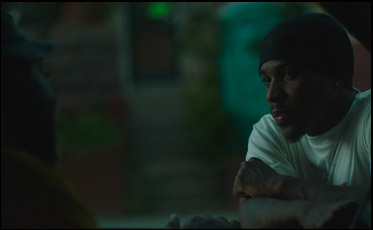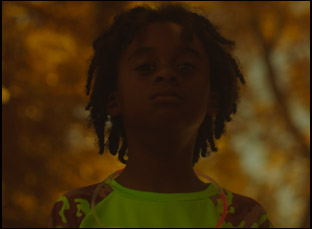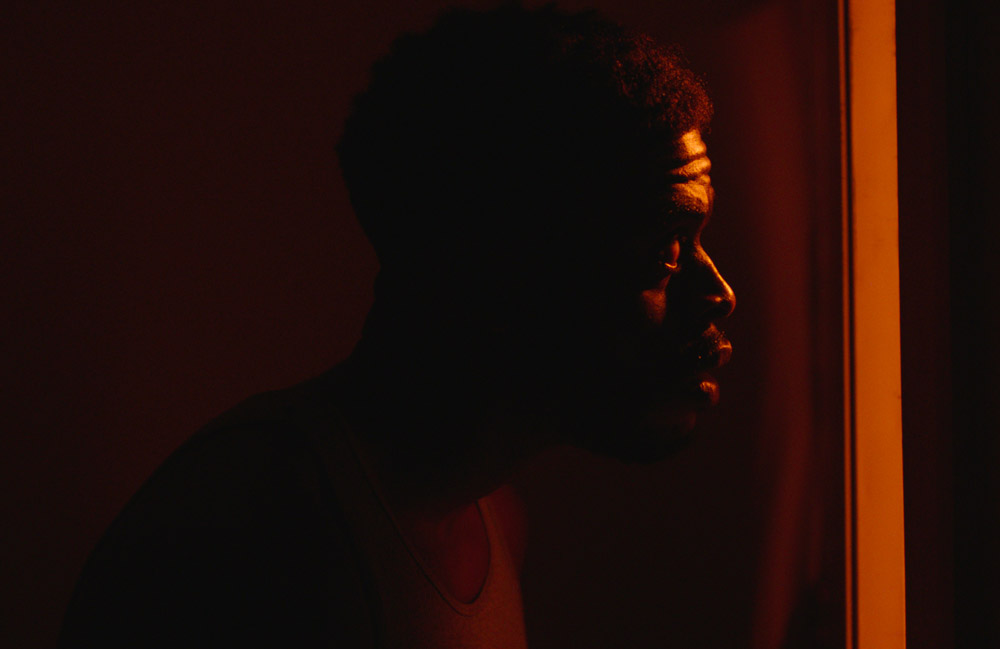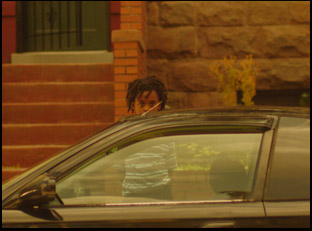“You’re getting a sense of the nature of our production,” Merawi Gerima tells me with a chuckle, moving for the third time in a matter of minutes during our interview, from the streets of Venice. Displaced by the sound of a weedwacker in one direction, he worries about the quality of the call from his end as some planes fly overhead and he inadvertently moves towards some construction work, but he’s handling it all with considerable grace, suggesting that he’s probably a pretty damn good director if his film wasn’t evidence enough. As it happens, this itinerant interview couldn’t be more ideal given the already loosely autobiographical story of a young filmmaker named Jay (Obinna Nwachukwu) who returns home to Washington D.C., only to seem as if there’s no place for him as the African-American neighborhood he grew up in is rapidly being gentrified.
“Let me tell you man, I came to love the interruptions and the things that would happen that were outside of our control,” says Gerima, who found novel ways to connect his lead’s psyche through the diegetic sounds that would’ve upended most productions. “I was the boom operator and the sound mixer while I was directing because we couldn’t get a sound editor in DC with our budget, and the scene where the guys are trying to talk to [Jay’s] girlfriend and that little confrontation in the moment, the construction was built into the production sound, there was no getting around it. At first, I was like, ‘Dang, you can hardly hear [the actors].’ But then I thought no, that’s actually perfect because it just adds to [Jay’s] sense of powerlessness. He’s totally ineffective in that moment, and [the sound] just adds to this overall oppressive nature of being in that city where everything is under construction at all times. His ability to relate to people, including his girlfriend, is impaired by everything that’s going on.”
If D.C. no longer felt like home to Gerima, who grew up there while both his parents Haile Gerima and Shirikiana Aina taught filmmaking at Howard University, there’s mild irony that he so richly conveys that disorientation that there’s no doubt he belongs at the vanguard that was recently celebrated at the Venice Film Festival, where “Residue” made its international premiere. Following Jay as he goes back to the old block — ostensibly in search of an old friend named Demetrius, who sadly could’ve been killed or sent to prison without making too much of a splash – the drama may start with connecting the dots of a disappearance in the physical realm, but comes to observe him work towards reconnecting with who he once was, unpacking memories that can give him perspective as the continual cacophony of construction threatens to outpace what he can remember.
Although Gerima would point out before you do that the production was scrappy, there’s a rawness emotionally and viscerally to “Residue” that gives it a striking immediacy, making Jay’s experience of the past constantly breaking into the present become especially vivid and bending naturally occurring images and sounds in such a way that the familiar can seem foreign and twist them back once Jay starts getting his bearings. With the film making its way onto Netflix through ARRAY this week, the writer/director spoke about activating the community he grew up in to get involved in bringing their story to the screen, the trial and error involved in getting the authenticity he wanted in the drama and continuing to learn and grow as a filmmaker with “Residue” being just the start.
I’m from Washington D.C. originally and I went away for a little bit to film school and when I got home after a year away, everything had changed so much. That’s what kicked everything into motion. I started writing immediately. That was my way of funneling my whirlwind of emotions into something productive — that was my only way of really seeing moving forward. Once I started writing the script, I felt like there was something I could do. That’s when I began to feel I could fight back. But at that point, I would say the script was pretty bad. It was just angry and petty, and looking back now, I’ve been thinking about my friends who have been falling to the wayside for a long time. 2011 is the date I found in my journal when I found out some bad news about one of my best friends growing up and the story of wondering what happened to him [became] the true seed and heart of the story and once that became infused in the script, it really started taking off and started making sense.
One of the things I love about it is how memory works in the film. A lot of it is instinctive editing, but is that something you figured out at the beginning of the process?
When I’m walking through D.C., it’s like that. I often think one of the saddest things is when I have kids, I can’t take them to a lot of places where I grew up – like “I used to do this here, I used to do this there.” They’ll never know what city I grew up in because it’s not there anymore. It’s frustrating. And I’m bombarded by memories walking through the city — my most favorite memories of things that happened all around and the ghosts of my childhood are there and present, so that was always in the script. But stylistically even down to the editing, a lot of that had to do with the imperfections of the production, just trying to make what we shot poorly often work.
It really pushed me to come up with some really cool solutions to some of the issues we ran up on — it lent itself to this kind of nonlinear style of storytelling and it’s interesting because we had a mantra of just allowing the imperfections to seep through. It allowed us to be free and be open and capture things as they were happening, so it has taken on this kind of documentary element. We had a running mission as we were shooting in my neighborhood, I told my cinematographer Mark Jeevaratnam “Any time you see a white person, just film them.” [laughs] “Stop what you’re doing and turn the camera because we’ve got to get that footage of what’s going on.” And that really helped to really capture things we couldn’t have planned for.
Did you keep it pretty loose when it came to the structure of scenes? One of my favorite scenes early in the movie is where you see Jay talking to the older guys on the stoop and then Jay leaves and you stay with the guys, just chatting it up.
Yeah, we were working off the first draft of the script, and as you know, you try to go for at least a second draft before you go onto production, but the fact that the story was still settling allowed us to author on the fly, and that informed the shooting style. Like those dudes on the stoop, those are the people I grew up around and they brought such an amazing, genuine energy to the thing that you just love to hear them talk. And one of them – the dude who’s talking about how he’d like to go back to the liquor store, he had a little drink next to him and he was getting a little more tipsy as we were shooting, so the takes were getting better and better as we went on. [laughs] It was the type of thing where it was fluid and natural and [they were] just being themselves, [and we were] allowing that to flourish and encouraging it in a way that didn’t intimidate these non-actors. Because none of them had really sat in front of a camera before outside of their childhood around my parents, who are filmmakers as well, and they’ve documented their whole generation as best they could around the kids.
When it’s such a familiar environment to you, what’s it like throwing Obi in as Jay?
Obi’s interesting, man. He’s quiet. He’s subdued, but he’s a chameleon and he’s up for any type of task. I threw him in some crazy situations and he’s just open to it. He’s done theater and a couple short films, but he wants to design his life around acting, so he was all for it and my style of filmmaking was brand new to him, but I think it allowed him to bring his own unique self. We would do things like maybe surprise him with information that maybe other actors would have and he knew the drill, just to be ready to react to different types of things. A lot of times it was a process of me learning how heavy a hand to have in there. There was a moment when we shot the prison scene, and we didn’t have much time, and I knew kind of what level of emotion I wanted and my cinematographer took me to the side and said, “I think I saw you step on his performance” because he had his eye on the lens. He said, “Maybe we should go pause everything, take a second and go again.” So we did it again and I didn’t say nothing to Obi at all and [that take is] in the film. He took it where it needed to go, beyond where I could’ve even directed him, so it was a beautiful process of us just figuring each other out on the fly.

Yeah, almost every moment we go looking for something and it turns out to be something else, but my favorite parts about the film are these serendipitous moments. We were primed to capture them because we were like, “We don’t know what’s going to happen or exactly what we want. We just know where we want to be.” The scene with the woman crying when her son is killed, that’s my mother, and it was a scene I would’ve liked to have shot in the rain if it came, but we didn’t have any rain machine or anything like that, so we just held it in our back pocket. We had another actress who was slated to play that role, but she didn’t show up, which would’ve been disastrous in any other situation, but my mother [Shirikiana Aina] happened to be there and this story is real for her because she was around helping to raise these kids, so she knows the pain of all of that.
[The scene] was this incredible monologue, and I had to be like, “Ma, I need you. The lady didn’t show up. I need you to play this part.” And [what you see onscreen] that’s her first take. She nailed it. And she wasn’t acting. But it was completely accidental. The rain was there only for enough for one take. The emotion was only there for one take. I couldn’t ask her to do it again. And that’s what we got. Even then I thought we ruined it, the way we shot — she was behind the building in the beginning [slightly out of frame], but the way it plays out, it worked perfectly for the story. It just fits right into the rest of it. All the time it was imperfect and things are happening left and right and we’re just responding in a way that allows that to happen and to tell our story even better, more authentically.I know it runs in the family, but were you always planning on becoming a filmmaker?
Oh no. I used to want to be a video game developer when I got to school, and then my first major was biology. I was thinking about becoming a psychiatrist, and I changed to jazz studies and I wanted to be a guitarist and played the guitar for a little bit. Then it was 3D graphics and I changed to graphic design and that’s what I graduated undergrad with. It wasn’t until I was looking at my life after that point where I was [thought] none of these things are really suiting me in the things I feel inside that I want to express, so I was like, “Let me give film a chance.” I applied to film school and did a little short film and it was clear, there’s enough levers in this medium that I could pull and get a handle on that I could start to say the things I want to say. And the more I go, the more free and expressive I feel.

There’s so much going on, still so much to do. I feel I’m in the thick of it with this one and it was important that [I use this production cycle to] reveal every aspect of the filmmaking process to myself so nothing is opaque to me. [Right now] I’m learning about things I never even knew about in terms of film delivery to a distributor and the festival circuit. It’s all just one massive undertaking after another, but I feel like after this, I want to make myself into a Swiss Army knife of independent film production because I’ve seen my parents struggling in black independent film to birth these films they work on. It takes 10 to 15 years sometimes to make a film, so I’m inspired to learn as much as I can to be more effective and helpful to folks like my parents and myself and other people who may not have resources like that, and my focus is constantly squeezing every bit out of all these lessons before me.





